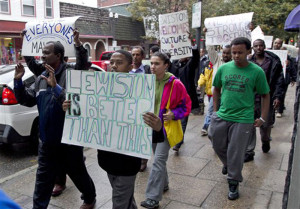From Lewiston, Maine, here’s a African refugee story with a difference

A march in Lewiston, Maine, in October 2012, asking the city’s mayor to resign because of comments he made about Somali refugees
Here’s a refugee story with a difference. In Lewiston, Maine’s second-largest city, Somali refugees are bringing new vibrancy to the declining former mill town. There presence is a controversial issue, of course (how could it be otherwise) but generally,
Since 2002, the number of children in Lewiston’s schools has risen by 10 per cent. As this piece on Bloomberg View points out, this is a minor miracle considering that it’s falling by 15 per cent in other parts of the state. Even Maine’s staunchly Republican governor Paul LePage, who grew up in Lewiston, admits that his state – which has the oldest, whitest and slowest-growing population in the United States – needs more people to thrive. “We have more people in Maine dying than being born,” he said last year.
In the 1990s, Lewiston’s population dropped by 10 per cent and the city never really recovered from the closure of mills. According to Bloomberg, Lewiston’s 4,000 or so Somalis “brought new life to downtown – new restaurants and shops, businesses, even a mosque. Many found jobs in and around Lewiston, and for those who didn’t, their welfare payments still helped the local economy.”
But, as we are seeing happen in Germany with testing issues such as offering a welcome to refugees, Lewiston is torn.
This is obvious in its political dilemma. The Democratic candidate for mayor Ben Chin, who advocates continued public assistance for asylum-seekers, recently beat Robert Macdonald, the Republican incumbent two-term mayor. There will be a runoff. The only certainty is more heated debates about culture, community and public money for refugees from Africa.

